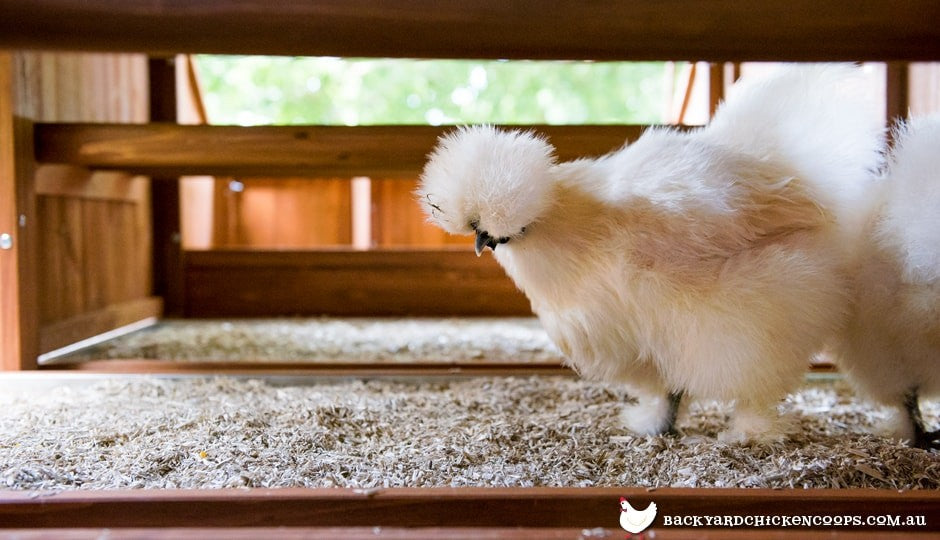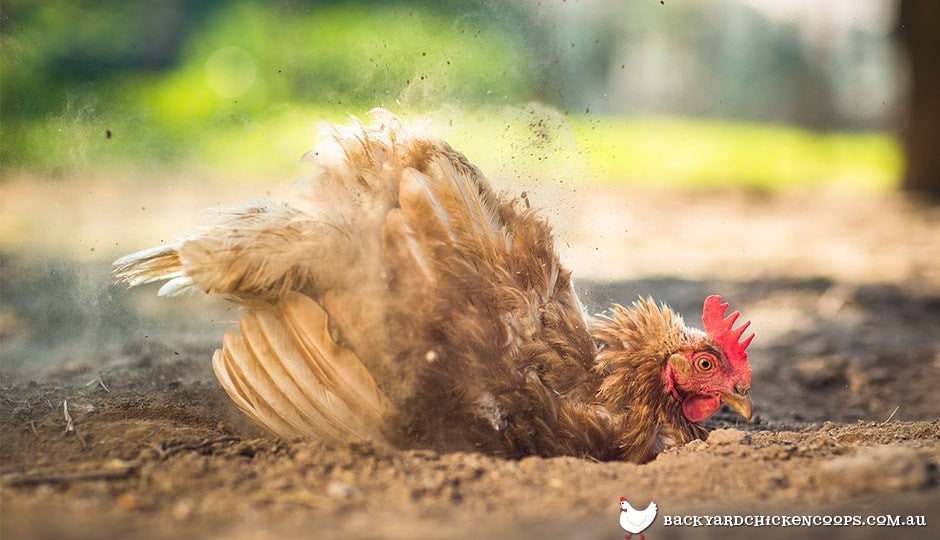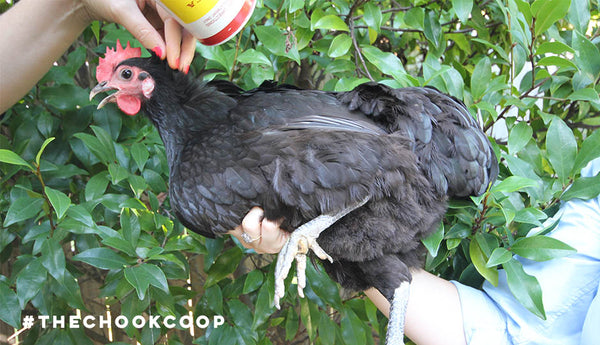Chickens and cleanliness go hand in hand or rather, wing in wing. Chickens love to be clean! Clean chickens are happier, healthier, more active and interactive. If you enjoy the luxury of spending LOTS of quality time with your chooks, then you’ve no doubt observed your fastidious feathery cleaning machines at work. Being clean just feels better!
A Clean Coop = A Cleaner Flock
Keeping your chicken coop clean is quite easy. It takes just a matter of minutes each day to ensure that your chooks have a clean place to call home. Daily scooping of droppings, checking for and wiping off any messes on feeders and waterers, rinsing and replenishing waterers and possibly freshening up the nesting boxes and that’s it! You’ll be done in a hop, skip and a flap! By developing and sticking to a daily cleaning routine, you’re not only ensuring that your chooks are comfortable, but you’re also helping to keep parasites, disease and odors away. While we’re on the subject of odor in the chicken coop, let’s cluck a little bit about odor eaters-fragrant chicken-friendly herbs make egg-cellent additions to nesting boxes.
Bedding, the foundation of your chicken’s living quarters, is often the difference between an easy coop cleaning routine and a messy, potential disease causing, headache. Bedding matters! There are bedding choices and then there are bedding choices-both sand and hemp make egg-cellent bedding for chickens. Sand bedding is easy to clean as droppings can be quickly scooped very similar to cleaning a cat’s litter box. Hemp bedding is highly absorbent, repels pests and is an all- natural product. Pine wood shavings is also an egg-cellent choice.

Chicken feet will travel here, there and everywhere and without a doubt those chicken feet will step in messes. Whether it be their own or another animal’s droppings, wet garden soil or mulch, chickens will inadvertently take a step in the messy direction. Dirty chicken feet can soil freshly laid eggs. If perchance your chooks just can’t seem to scrape or peck off the muck that may accumulate on the bottoms of their busy little feet, a quick soak in a tub of warm sudsy water will have them in flap and go shape!
Dust Bathing Beauties
One of the most delightful aspects of being a backyard chicken keeper is seeing your chooks’ daily dust bathing ritual. Watching them flop around in dusty dry dirt is really quite a sight. It’s definitely an egg-straordinary process! While this dust bathing ritual seeks to eliminate any previous oily residue and works to keep feathers healthy, it also aids in ridding your chooks of the unwanted attention of external parasites. This dusty cloak does not remain on them for very long though, as soon as they’ve dusted themselves to their satisfaction, they proceed to shake it all off. Whilst this may seem futile to us, there is definitely a method to their cluckiness! Their little shake-a-go go dance sends pests and miscellaneous debris flying.

One good flop in the dirt deserves another and another and…soon you will find several dust bathing beauties enjoying a lovely bath together. Social bathing is a natural chicken ritual.
Perfectly Preened
Preening is a chicken’s way of brushing and washing their fabulous feathers. Chickens come equipped with a special gland known as the Uropygial Gland or preening gland. Located on a bird’s back just above their tail feathers, this gland secretes a thick clear waxy oil often referred to as preening oil. After a chicken has shaken off any residual dust from their baths, they begin the preening process. The chooks rub their beaks over their preening gland and spread the oil through their feathers. This action works to condition their feathers, just like we do after shampooing our hair.
Freshly preened chicken feathers are stronger and more able to withstand any wet weather that comes their way. Some scientists even feel that preening oil contains antibacterial properties. Chickens generally preen themselves two times a day.
Don’t Worry, Beak Happy!
Chooks love nothing better than freely roaming around and foraging, curiously pecking at tasty treats here and there, ultimately egg-sploring every nook and cranny of your backyard. So, it’s fair to say that every once in a while their beautiful beaks will no doubt get them into a sticky situation. With an innate curiosity for pecking at anything and everything from flower and vegetable gardens to eggs (broken or unbroken) wet soil and mulch. You name it, they’ll peck it!
When their beaks do come up for air, you may find your chooks with a rather puzzled look in their eyes. Something just isn’t right. Chicken etiquette is crystal clear when it comes to untidy chooks-hens must cleanse! So, what’s a poor curious chook to do? Chickens who’ve got a dirty beak simply rub their troubles away-they rub their beaks on hard surfaces to file off the mess so to speak. This action also serves to keep their beak fit and trim. Did you know? Beaks grow! However, the average backyard chicken is well able to keep their beak fit and trim by daily foraging and rubbing.
Vent Woes
Fuzzy chicks are the most likely victims of vent (the chicken bum) woes. It’s not uncommon to see young chicks with poopy little vents. Chicks raised by Mother hens tend to keep cleaner; however, brooder babies are more likely to succumb to this problem. Pasting up, as it is referred to, is actually a serious condition. When droppings stick to a chick’s vent, the mess blocks the small bird from eliminating waste. If you do spot a chick with a pasted up vent, gently soak its wee bum in warm water (no soap). It should soften enough so you can wipe it off. Now, while a pasted up vent normally is just a pasted up vent, sometimes it is a sign of something more serious. Your brooder may be too hot or too chilly. Infections or lack of appropriate nutrition can also cause vent woes.
Got chickens? Then you’ve inevitably seen some messy vents every now and then. When chickens stop to drop their droppings, sometimes if their droppings are more on the watery side, some may dribble down onto the feathers around their vents. Sometimes droppings stick right to the vent itself. There’s always one chook in every flock, right? You know the one-the chook who always tends to be messy in one way or another. Don’t despair! Just like with a messy foot or two, a nice soak in a tub of warm sudsy water will soften the droppings and you can swish the mess right off.
Bathing Your Beauties
Sometimes it’s necessary to bathe your chooks. Now, while they may utter a rather reluctant cluck or two, don’t fret. Keep your eye on the prize-a clean and chipper chook!
Thankfully, chickens being the neat freaks they are, will probably seldom need you to bathe them, as they tend to get a little clucky and flappy. Though it’s not difficult to bathe a chicken it can be awkward depending upon the individual chook’s personality. Again, a nice soak in a tub of warm sudsy water, a swish here, a swish there and your fine feathered friend should be good to go.
Clean, Clean, Delightfully Clean!
A clean chicken is a happy chicken and happy chickens make happy backyard chicken keepers. Kudos to all fine feathery fastidious cleaning machines!


















